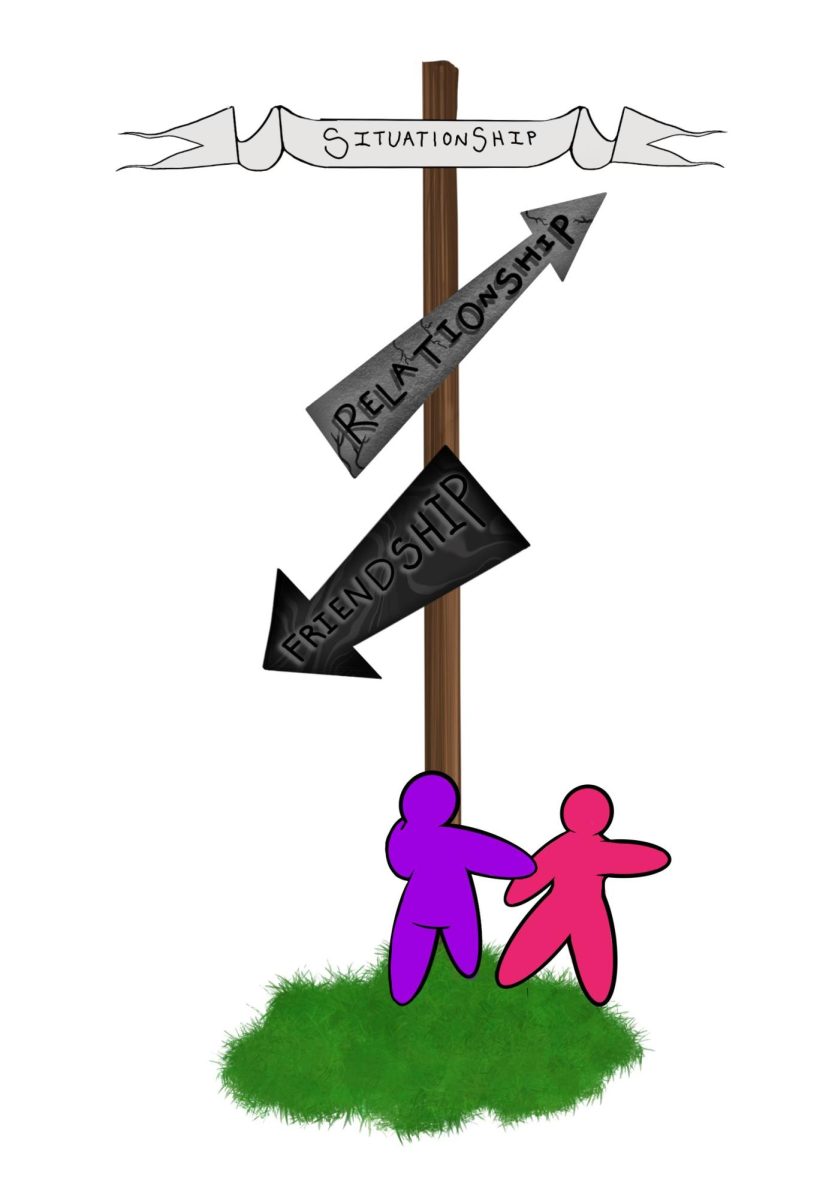“What are we?” The question no one wants to ask, but everyone wants the answer to. Talking stages and situationships: the gibberish jargon of our generation. What does it all mean? As one Garfield student puts it, “a talking stage is when you’re trying to get to know someone to see if you would be interested in being in a relationship or even situationship with them.” Those who know about the talking stage also know the frustration when three months go by and nobody has clarified what’s going on. At some point in an ambiguous relationship, a talking stage can turn into what this generation has named a situationship. But what is a situationship?
It’s a tough state to define, and that’s a huge part of the problem. “A situationship is kind of the next level after talking,” one student said. “It’s not a relationship, not a friendship, but somewhere in between.” Another student described the characteristic confusion of these circumstances: “You can’t really tell what’s going on because no one’s really communicating what it is.” The word situationship is relatively new, and although complex situations like these still existed in older generations, they were significantly less common than they’ve become today. It begs the question: Why are so many of today’s teenagers avoiding commitment?
A large part of the confusion has to do with technology and the recent prevalence of social media. “In the days without social media, you had to actually get to know people face to face, but now there’s this image online, this personality, that everyone can curate,” one Garfield student said. “I think that social media makes it incredibly easy to be in a talking stage and have low commitment,” another student added. What about social media is so harmful? Garfield students had a lot to say about one platform in particular. “Snapchat is the problem,” one student said. “It’s a lot more secure to talk to someone on Snapchat than Messages. You can see when they are active, you know when they open something, you know when they’re typing… It just makes it a lot more transparent,” they continued. “Snapchat makes it super easy to just talk to so many people at once,” another student added. “Having a whole roster is so normalized.” Social media isn’t the only cause though. “It’s very hard to know as a teenager exactly what you’re looking for,” said another source, “To know what you want, you have to take the time to know yourself and a lot of people don’t have the time for that right now, especially in high school.”
One Garfield student explained their reasoning behind avoiding relationships. “I like talking stages more than I like relationships. I like to be able to have a connection with someone and explore that connection while not feeling like I’m required to explore it all the time.” Another student gave their opinion as well, “I feel like the commitment thing goes a lot with decision making and I feel like I don’t need to decide.”
Another huge reason behind this new type of relationship seems to be a generational fear of commitment and labels. “I think that the label of girlfriend or partner, or whatever, definitely sets off a reaction in me of ‘oh, this means this is leading to be in love, this means this is leading to a long-committed relationship,’” one student commented. Another source corroborated, “So many people are scared to get into a relationship cause they think ‘once they’re in it, they’re trapped.’” Continuing with the emerging theme, the student pointed out, “I think putting a label on a relationship makes people scared because that’s a whole other reason not to leave.”
On the other hand, for those who do want some level of commitment, situationships can often prove to be negative and hurtful. One student explained why, “I think that for someone who wants that commitment to have to undergo a long talking stage where they might not know what’s happening next, [it] leaves them in a lot of uncertainty and fear that [they] might never get [what they want] out of that relationship.” Some students shared their own experiences with not getting the level of commitment they wanted. “I think that it was like day and night. To constantly face timing and texting to like zero, from one day to the next,” said one source. Another student went on to explain, “There’s this whole game you have to play, and I get that people play it to protect themselves, but then they end up hurting someone else and then that person [learns] the game so they can protect themselves and it’s this whole cycle.” They continued with their own experience, “He doesn’t want to hurt me, he just doesn’t know the best way to not hurt me.” They finished by summing it up, “I feel like situationships are lose-lose situations.”
One source has noticed another problem emerging alongside this one, “There’s just a lot of judgment for being genuine in this generation,” they said. “I think people are really hesitant to admit that they love someone because they think it makes it more special if they love less people… They need to realize that they need to stop judging people for loving truly and deeply.”
“I think if we continue along this track it’s going to end up in a lot less marriages, a lot less long-term relationships,” expressed a student at Garfield. “People are going to lose sight of the importance of commitment and companionship.” So how does one avoid this condition that’s sweeping our generation? “It’s all about communication, everything is about communication.” The same student said, “If two people in a situationship want two different things out of it, that can be harmful. That’s why you have to communicate.” Or, as one student puts it, “People need to be for real.” Either way, communication and honesty prove time and time again to be essential in finding a healthy relationship with anyone. “It’s never wrong to love someone, and it’s never wrong to express the love you have,” concluded a student. “Humans are literally made to love each other.”





